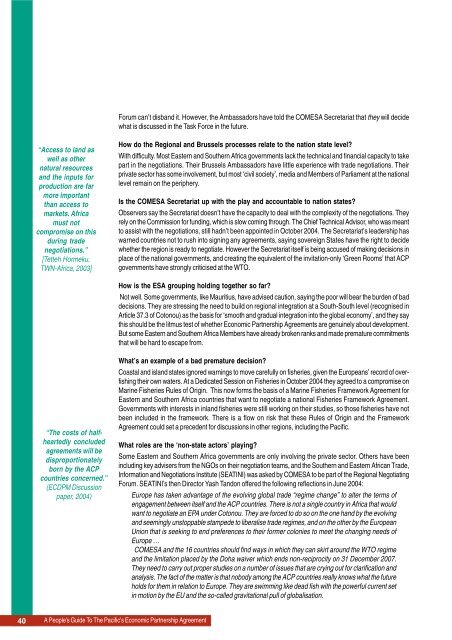REPA Booklet - Stop Epa
REPA Booklet - Stop Epa
REPA Booklet - Stop Epa
Create successful ePaper yourself
Turn your PDF publications into a flip-book with our unique Google optimized e-Paper software.
Forum can’t disband it. However, the Ambassadors have told the COMESA Secretariat that they will decide<br />
what is discussed in the Task Force in the future.<br />
“Access to land as<br />
well as other<br />
natural resources<br />
and the inputs for<br />
production are far<br />
more important<br />
than access to<br />
markets. Africa<br />
must not<br />
compromise on this<br />
during trade<br />
negotiations.”<br />
[Tetteh Hormeku,<br />
TWN-Africa, 2003]<br />
How do the Regional and Brussels processes relate to the nation state level?<br />
With difficulty. Most Eastern and Southern Africa governments lack the technical and financial capacity to take<br />
part in the negotiations. Their Brussels Ambassadors have little experience with trade negotiations. Their<br />
private sector has some involvement, but most ‘civil society’, media and Members of Parliament at the national<br />
level remain on the periphery.<br />
Is the COMESA Secretariat up with the play and accountable to nation states?<br />
Observers say the Secretariat doesn’t have the capacity to deal with the complexity of the negotiations. They<br />
rely on the Commission for funding, which is slow coming through. The Chief Technical Advisor, who was meant<br />
to assist with the negotiations, still hadn’t been appointed in October 2004. The Secretariat’s leadership has<br />
warned countries not to rush into signing any agreements, saying sovereign States have the right to decide<br />
whether the region is ready to negotiate. However the Secretariat itself is being accused of making decisions in<br />
place of the national governments, and creating the equivalent of the invitation-only ‘Green Rooms’ that ACP<br />
governments have strongly criticised at the WTO.<br />
How is the ESA grouping holding together so far?<br />
Not well. Some governments, like Mauritius, have advised caution, saying the poor will bear the burden of bad<br />
decisions. They are stressing the need to build on regional integration at a South-South level (recognised in<br />
Article 37.3 of Cotonou) as the basis for ‘smooth and gradual integration into the global economy’, and they say<br />
this should be the litmus test of whether Economic Partnership Agreements are genuinely about development.<br />
But some Eastern and Southern Africa Members have already broken ranks and made premature commitments<br />
that will be hard to escape from.<br />
“The costs of halfheartedly<br />
concluded<br />
agreements will be<br />
disproportionately<br />
born by the ACP<br />
countries concerned.”<br />
(ECDPM Discussion<br />
paper, 2004)<br />
What’s an example of a bad premature decision?<br />
Coastal and island states ignored warnings to move carefully on fisheries, given the Europeans’ record of overfishing<br />
their own waters. At a Dedicated Session on Fisheries in October 2004 they agreed to a compromise on<br />
Marine Fisheries Rules of Origin. This now forms the basis of a Marine Fisheries Framework Agreement for<br />
Eastern and Southern Africa countries that want to negotiate a national Fisheries Framework Agreement.<br />
Governments with interests in inland fisheries were still working on their studies, so those fisheries have not<br />
been included in the framework. There is a flow on risk that these Rules of Origin and the Framework<br />
Agreement could set a precedent for discussions in other regions, including the Pacific.<br />
What roles are the ‘non-state actors’ playing?<br />
Some Eastern and Southern Africa governments are only involving the private sector. Others have been<br />
including key advisers from the NGOs on their negotiation teams, and the Southern and Eastern African Trade,<br />
Information and Negotiations Institute (SEATINI) was asked by COMESA to be part of the Regional Negotiating<br />
Forum. SEATINI’s then Director Yash Tandon offered the following reflections in June 2004:<br />
Europe has taken advantage of the evolving global trade “regime change” to alter the terms of<br />
engagement between itself and the ACP countries. There is not a single country in Africa that would<br />
want to negotiate an EPA under Cotonou. They are forced to do so on the one hand by the evolving<br />
and seemingly unstoppable stampede to liberalise trade regimes, and on the other by the European<br />
Union that is seeking to end preferences to their former colonies to meet the changing needs of<br />
Europe …<br />
COMESA and the 16 countries should find ways in which they can skirt around the WTO regime<br />
and the limitation placed by the Doha waiver which ends non-reciprocity on 31 December 2007.<br />
They need to carry out proper studies on a number of issues that are crying out for clarification and<br />
analysis. The fact of the matter is that nobody among the ACP countries really knows what the future<br />
holds for them in relation to Europe. They are swimming like dead fish with the powerful current set<br />
in motion by the EU and the so-called gravitational pull of globalisation.<br />
40<br />
A People’s Guide To The Pacific’s Economic Partnership Agreement
















